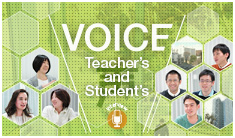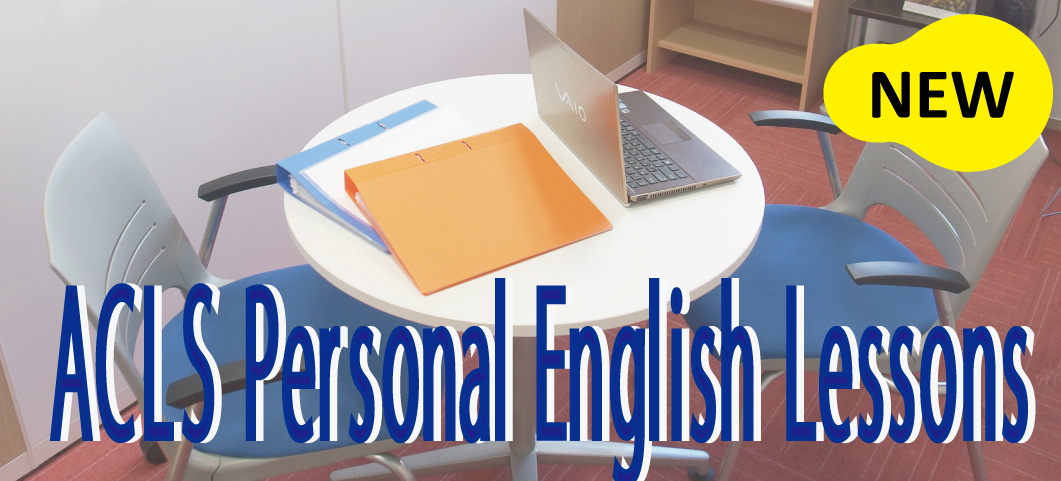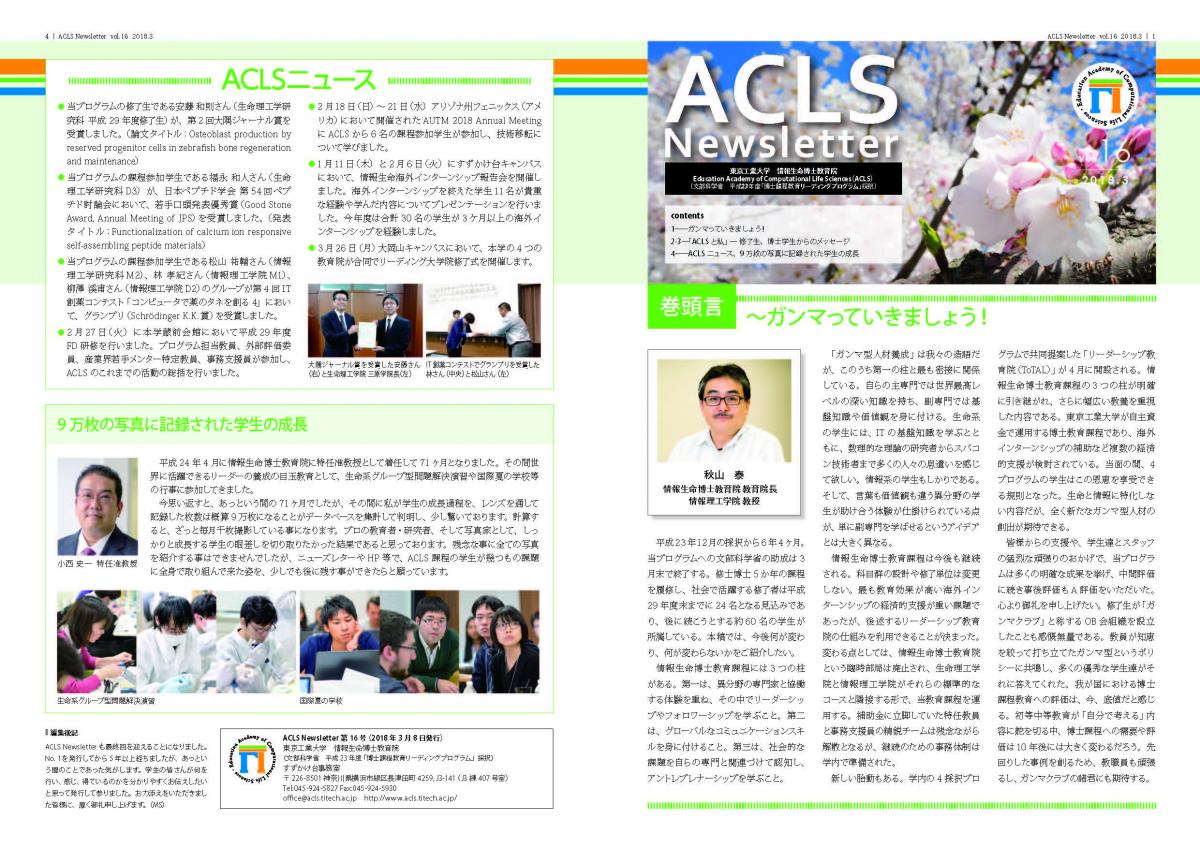- Home
- Teacher's and Student's voice
- Kenta Nohara / Hirotaka Shibata
Kenta Nohara / Hirotaka Shibata


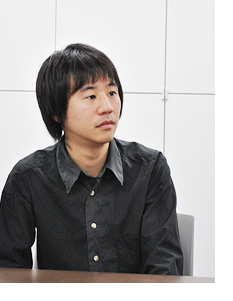 Shibata:I first heard about the plan to start the ACLS when I was in the first year of the master’s program. At that time, I was having trouble deciding whether or not to enter the doctoral program. Eventually, I decided to enroll in the ACLS program. The opportunity to study both life science and computer science, the pillars of the ACLS program, was not the only factor in my decision; I also found the chance to participate in overseas internships and overseas academic conferences to be appealing. Moreover, ACLS seemed to offer a thorough support system for students. Overall, I felt that the program would open new possibilities for me in the future. Although I conduct research in Japan, the contents of my research can be universal. For me, having the opportunity to conduct research overseas and to communicate with students in overseas laboratories was very appealing.
Shibata:I first heard about the plan to start the ACLS when I was in the first year of the master’s program. At that time, I was having trouble deciding whether or not to enter the doctoral program. Eventually, I decided to enroll in the ACLS program. The opportunity to study both life science and computer science, the pillars of the ACLS program, was not the only factor in my decision; I also found the chance to participate in overseas internships and overseas academic conferences to be appealing. Moreover, ACLS seemed to offer a thorough support system for students. Overall, I felt that the program would open new possibilities for me in the future. Although I conduct research in Japan, the contents of my research can be universal. For me, having the opportunity to conduct research overseas and to communicate with students in overseas laboratories was very appealing.
Nohara:I had always intended to enter the doctoral program. However, I was concerned that entering the doctoral program would result in excessive focus on a narrow area of research. In that respect, I was interested in how ACLS would enable me to study areas outside of life science, which is my academic major. To be honest, I would have been interested in any field outside of my specialty; it didn’t have to be computer science. In addition to enabling me to study new areas, the ACLS program also provides the opportunity to be out of my field and be active overseas, another facet which I found to be extremely appealing.
Shibata:At first, I was worried that I wouldn’t be able to devote enough amount of time to my research. Although I found that my research time actually did decrease upon participating in the program, I was able to acquire a variety of experience which cannot be obtained only through research. For example, during the Summer School, students have the opportunity to interact and perform group work with foreign students. The experience of conveying my research to people in other fields helped me refine my ability to give easy-to-understand explanations. Also, I became able to view my own research through new perspectives.
Nohara:It’s true that ACLS students are required to take a large number of classes, and I was initially worried that I wouldn’t have as much time for experiments. However, once classes actually started, I realized that I could handle the workload as long as I managed my time efficiently. Ultimately, I settled into a rhythm of doing experiment, going to ACLS class and then back to experiment again, and was able to concentrate on both aspects of my education. The experience taught me how to manage my time. Furthermore, I would sometimes get ideas related to my research while doing something completely unrelated. Overall, I am happy with my decision to enroll in ACLS.

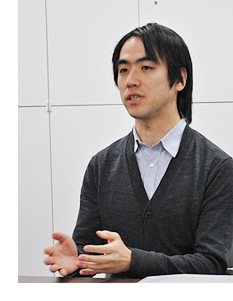 Shibata:My research deals with the control of gene expression in eukaryotes. The function and role of a cell is determined by genetic information. Through my research, I am working to define the rules which govern genetic information when determining the function of a cell and controlling phenomena within living cells. I am focusing on the control mechanism of genes in ES cells and iPS cells. I hope to identify new functions of genes and to make discoveries which will contribute to the realization of regenerative medicine.
Shibata:My research deals with the control of gene expression in eukaryotes. The function and role of a cell is determined by genetic information. Through my research, I am working to define the rules which govern genetic information when determining the function of a cell and controlling phenomena within living cells. I am focusing on the control mechanism of genes in ES cells and iPS cells. I hope to identify new functions of genes and to make discoveries which will contribute to the realization of regenerative medicine.
The prevalent trend in genetic research is to utilize enormous amounts of data, and knowledge of computer science is necessary to conduct analysis. Previously, I had been satisfied with producing analytical results. However, the opportunity to study the basics of computer science at ACLS has enabled me to use analytical techniques with more solid basis. I am sure that my skills have increased.
Nohara:I conduct research on microorganisms which produce hydrogen. Hydrogen is attracting attention as a next-generation clean energy that is an alternative to fossil fuels such as oil and coal. My research focuses on how microorganisms generate hydrogen, and on the possibility of increasing the amount of produced hydrogen by altering the genes of those microorganisms.
Although I had used information technology in my analysis of experimental data prior to enrolling in ACLS, I now realize that I didn’t understand the basics of that technology. I simply produced results by pressing the Enter key on my computer, and I always used the default settings without understanding the underlying process. Thanks to ACLS classes, I now understand the meaning of most setting values and have improved my skills to the point where I can effectively utilize information technology in my research.

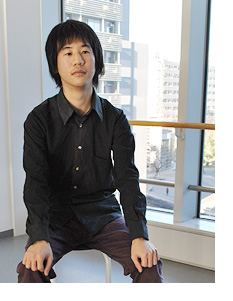 Shibata:The overseas internship. I spent three months conducting research at a laboratory at the Swiss Federal Institute of Technology. There were no other Japanese people, and more than half of the students had come from countries other than Switzerland. It was a truly global environment. I was able to experience firsthand the type of professionals and research styles which are found in cutting-edge environments.
Shibata:The overseas internship. I spent three months conducting research at a laboratory at the Swiss Federal Institute of Technology. There were no other Japanese people, and more than half of the students had come from countries other than Switzerland. It was a truly global environment. I was able to experience firsthand the type of professionals and research styles which are found in cutting-edge environments.
Nohara:Although the overseas internship also left me with a deep impression, I found the English classes from Science and Technology Communication Subjects have been extremely useful. I took small-group classes with a total of about five students. The classes were taught by an instructor from Berlitz language school. My class was lower-intermediate level, and all that students spoke in halting English. However, spending time talking with people at the same level allowed me to get used to speaking in English. If I had started in a class surrounded with high-level speakers, I don’t think I would have been able to talk. Once our proficiency had increased to a certain level, we didn’t just talk in English?we conducted debates in English. The class really forced me to think hard, and I could gain confidence in my ability to speak English.
Shibata:ACLS provided me with support to realize my quest for new experiences. I was able to achieve things which I never could have done otherwise. For example, I was able to take on challenges such as corporate internships with a positive mindset. If I hadn’t participated in ACLS, I wouldn’t have had the opportunity to explain my research to people in other fields. The wide range of experience provided by the program helped me to become mentally tougher.
Nohara:I achieved a clear understanding of what I can and cannot do; likewise, I also understand what can be accomplished via the areas of expertise held by others. Through ACLS, I developed the ability to consider how I use my own field of expertise to complement the works by other people. Furthermore, participating in ACLS events provided me with more opportunities to meet highly-skilled professionals from both Japan and overseas. At first, I was overwhelmed by these encounters and worried if I had what it took to become a first-class global researcher. However, I reaffirmed my resolve to prove my worth as a researcher, and my renewed commitment helped me to improve my skills.

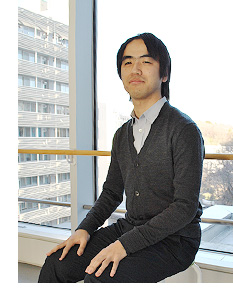 Shibata:I will work as a consultant after graduation. I developed an interest in this profession as a result of participating in lectures and discussions which featured appearances by alumni and corporate officials. These kinds of events were frequently held at ACLS. Hearing the opinions of actual professionals enabled me to form a clear vision of how my skills could be utilized in society. Participating in these events together with other students was another merit. Specifically, it allowed me to see how other people view certain professions, helping me to make a more concrete decision regarding my own position and to determine whether I possessed the aptitude for certain occupations.
Shibata:I will work as a consultant after graduation. I developed an interest in this profession as a result of participating in lectures and discussions which featured appearances by alumni and corporate officials. These kinds of events were frequently held at ACLS. Hearing the opinions of actual professionals enabled me to form a clear vision of how my skills could be utilized in society. Participating in these events together with other students was another merit. Specifically, it allowed me to see how other people view certain professions, helping me to make a more concrete decision regarding my own position and to determine whether I possessed the aptitude for certain occupations.
Nohara:Originally, I had intended to conduct my own research after graduating from university. However, upon participating in ACLS, I recognized that there are many researchers who possess outstanding ability. I also realized that I am more suited for work which involves supporting the research of others, rather than conducting my own research. After graduation, I will work at a manufacturer of experiment equipment. My experiences at ACLS made it possible for me to set my sights on this profession.
Shibata:I was confident in my logical and scientific skills, so I advertised myself during interviews as a professional who can adapt to working at a corporation. Since I had spent a long time studying at university, I felt that interviewers were focused on the question of my adaptability. Therefore, I discussed the many experiences which I had had at ACLS, and I focused on conveying the basis for my confidence that I can contribute as a working professional. Although I felt a little uneasy at first, a thorough understanding of my own strengths and weaknesses gave me peace of mind.
Nohara:During interviews, I stated that I am a person like “bamboo.” This means that while I am flexible enough to accept the opinions of others, I also possess my own solid core. Students from doctoral programs tend to be viewed as narrow-minded individuals who refuse to listen to others and engage in selfish behavior. I wanted to eliminate such negative preconceptions from my very first meetings. To substantiate my assertions, I discussed how I had acquired solid skills necessary to conduct my own research overseas while also studying the completely new field of computer science at ACLS and learning much from many different people around me. I included specific stories in my explanation.

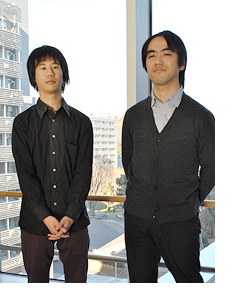 Shibata:One appealing point of ACLS is that students can select their own mode of involvement. If you want to concentrate on research, you can enroll only in the Summer School and classes. If you want to gain new experiences, ACLS provides more than enough experiences to satisfy anyone. Participating in events also allows you to obtain an objective view of yourself. If you are undecided about whether or not to enroll in ACLS, I advise you not to hesitate. Just take action and don’t worry about the workload or uncertainties. The program will enable you to gain experiences which you can never have alone.
Shibata:One appealing point of ACLS is that students can select their own mode of involvement. If you want to concentrate on research, you can enroll only in the Summer School and classes. If you want to gain new experiences, ACLS provides more than enough experiences to satisfy anyone. Participating in events also allows you to obtain an objective view of yourself. If you are undecided about whether or not to enroll in ACLS, I advise you not to hesitate. Just take action and don’t worry about the workload or uncertainties. The program will enable you to gain experiences which you can never have alone.
Nohara:It’s true that the ACLS program is demanding. However, it also provides outstanding experiences such as overseas study and interaction with corporate professionals. Reflecting back, I now realize that gradually increasing the difficulty of classes in accordance with my own level was an experience unique to ACLS. If you seek personal growth, then I highly recommend the ACLS program.
※The content of this article is accurate at the time of the interview, December 2015.






